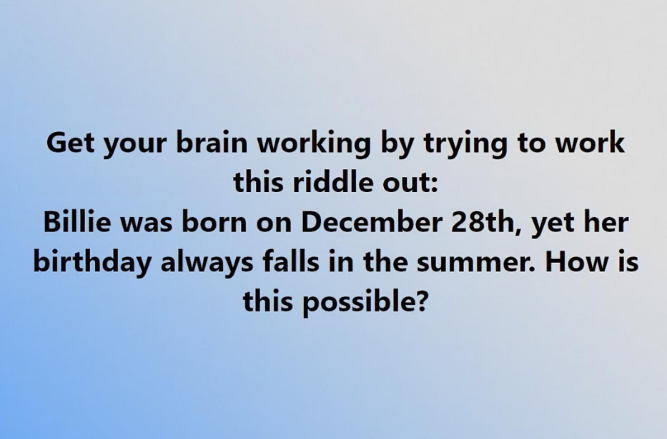Riddles have been a source of entertainment and mental stimulation for centuries. They challenge your thinking, push you to analyze small details, and make you question your assumptions. Today, we have a particularly tricky riddle that will test your problem-solving skills. Ready to dive in?
The Riddle: Billie was born on December 28th, yet her birthday always falls in the summer. How is this possible?
At first glance, this riddle seems to make no sense. December is typically associated with winter, so how can Billie’s birthday always be in the summer? Let’s break this riddle down and figure it out step by step.

Common Mistakes When Solving Riddles
When approaching a riddle like this, many people fall into common traps. Here are some mistakes that can throw you off:
1. Assuming December Is Always a Winter Month Most people associate December with winter because, in the Northern Hemisphere, it’s typically cold and snowy during that time. However, this assumption isn’t universal, as we’ll soon see.
2. Overcomplicating the Riddle Some might overthink the problem, considering time travel, magical seasons, or other far-fetched ideas. The beauty of riddles is that they often have simple, logical solutions. In this case, the answer is straightforward and rooted in geography.
These mistakes reveal how easy it is to misinterpret a riddle. Riddles play on words and small details, so paying close attention to every aspect of the question is essential.
Breaking Down the Riddle
Let’s walk through this puzzle step by step to uncover the answer.
1. Billie Was Born on December 28th This part of the riddle is straightforward. Billie’s birthday is December 28th. Nothing tricky here—just a simple fact.
2. Yet Her Birthday Always Falls in the Summer Here’s where the confusion sets in. If you’re thinking from a Northern Hemisphere perspective, December is clearly a winter month. However, this riddle requires a shift in thinking.
3. The Key: Geography and Hemispheres The vital clue here lies in geography. While December is indeed a winter month for those living in the Northern Hemisphere, the seasons are reversed in the Southern Hemisphere. That means in countries like Australia, New Zealand, South Africa, and Argentina, December is part of the summer season.
The Solution: Billie Lives in the Southern Hemisphere
The answer to the riddle is simple: Billie was born in the Southern Hemisphere, where December 28th falls in the summer. So, while people in the Northern Hemisphere might associate December with winter, it’s actually the heart of summer in the Southern Hemisphere.
Why This Riddle Works
The cleverness of this riddle lies in how it plays with assumptions. Most people instinctively associate December with winter because that’s their experience. The riddle tricks you by relying on that assumption, when in fact, the seasons change depending on where you are in the world.
This type of riddle is a great exercise in critical thinking because it forces you to question your initial thoughts and consider alternative possibilities. It’s a perfect example of how thinking beyond the obvious can lead you to the correct answer.
The Importance of Riddles in Sharpening Your Mind
Riddles like this one are more than just fun—they serve as powerful tools to improve your mental agility. Solving riddles requires you to:
- Think Critically: You can’t take everything at face value. You need to analyze each word and look for hidden clues.
- Challenge Assumptions: Many riddles, like this one, rely on you making false assumptions. Breaking away from those assumptions is key to finding the solution.
- Increase Attention to Detail: Every word in a riddle is placed there for a reason. By paying attention to the finer details, you’re more likely to see through the trickery.
When you engage with riddles regularly, you’re training your brain to think outside the box, notice subtle patterns, and improve your problem-solving skills. Plus, they’re an enjoyable way to exercise your mind!
Conclusion: The Joy of Riddles
Riddles are a fantastic way to keep your mind sharp and engaged. They force you to think critically, challenge assumptions, and pay attention to the details. The key to solving Billie’s birthday riddle was in recognizing the shift in seasons between hemispheres—a simple yet often overlooked fact.
Did you figure out the riddle, or did it stump you? Either way, riddles are a great way to test your brainpower and improve your problem-solving skills. Keep challenging yourself with more brainteasers, and you’ll become a riddle master in no time.
So, the next time you come across a tricky puzzle, don’t get discouraged. Take a deep breath, analyze the details, and enjoy the process of solving it. Happy puzzling!


